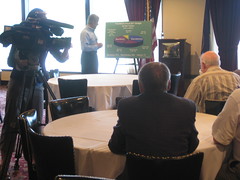During the recent Midwest Rural Assembly, Nebraska Senator Mike Johanns stopped in South Sioux City for a community coffee. Since it happened to be in the same building we were in, I stopped in to listen, too. Here are my live notes from the senator’s presentation and the question and answer period. This is not intended to be a political editorial; it is intended to be a report of what I heard. I didn’t even know the senator’s name or political party when we met.
 The senator focused his talk on the budget. He presented a short set of poster cards to illustrate the numbers. Mandatory spending covers 57% of the federal budget, Senator Johanns said. Much of what we call “discretionary” isn’t all that discretionary. Security, military and related items are included in the discretionary label. Nonmilitary discretionary spending is 14% of the federal budget.
The senator focused his talk on the budget. He presented a short set of poster cards to illustrate the numbers. Mandatory spending covers 57% of the federal budget, Senator Johanns said. Much of what we call “discretionary” isn’t all that discretionary. Security, military and related items are included in the discretionary label. Nonmilitary discretionary spending is 14% of the federal budget.
Individual income tax generates 44% of the budget. The total revenue estimate is $2.567 trillion. The deficit is projected at $1.2 trillion, he said.
“The reality is we haven’t had a lot of balanced budgets going back a long long time,” Senator Johanns said. “We’ve done that pretty consistently year after year.”
Showing a chart that showed deficits going back to the 1970s, the senator said, “This is what we have done over the course of my adult life.”
“The truth is, that is someone’s future standard of living,” he said. “They will have their own wars, their own flu pandemics, their own new technology.”
The senator said that China is cutting back on their ownership of US debt. “They have signaled that for a long time because they are worried about us.”
“We didn’t get here overnight,” he said. “We got here over my lifetime. We won’t solve it overnight. We have to find some way to arrest that cycle.”
The proposal from the bi-partisan fiscal working group may be brought to the floor non-amendable. The vote would have to be for or against, without changes. The senator said he expects the proposal to come for a vote before the end of the year.
The first question from the audience was, “What do you think we should do?”
Johanns answered, “You’ve got to come to grips with what is driving that mandatory portion of the budget. None of the adjustments that can be made are easy or popular, or they would already have been done. Unfortunately, with the baby boomers, the Medicare portion is going to be the key.”
“I am suggesting you arrest this (he slanted his hand up) and start to do this (he slanted his hand down).”
Native American activist Frank LaMere brought up a federal policy that is making it harder for the tribes to do business. Sen. Johanns said that he sits on the Indian Affairs Committee, and he was told that he is the first Nebraska senator to serve on that committee. He asked to talk directly with the leaders to find out what specific actions he could take to help.
The next question was about immigration reform. The questioner stated that the federal government should step in and not let every state do their own solution. The senator answered with the three policies he would like to adopt: No amnesty. Better border enforcement. Workplace enforcement.
“We can’t have people pouring over the border, when you don’t know why they are here,” he said. “I don’t think we’re being unreasonable.” He said that no other country would let you just overstay their visa.
Lance Morgan, CEO of the Ho-Chunk Inc, pointed out that the senator has been to several Ho-Chunk events, such as new business openings. (As an aside, he said, “I’m the Ronald Reagan of Winnebago. I think that still makes me a liberal.”) He told the senator, “You always ask how you can help, and the best thing you can do is leave us alone.” Morgan said Ho-Chunk faces an incredibly escalating rate of health insurance.
“Boy I would love to have you sit down with my staff,” Johanns said. “Maybe from my place on Indian Affairs, maybe there are some things we can do to let you kind of do your own thing.”
Another questioner asked about the new pipeline that is proposed to cross Nebraska. Will there be any requirement for an emergency response plan or a fund in case of a leak or spill? The Senator said the state may not have the ability to do very much here, because it is under the jurisdiction of the State Department. Rather than a response plan or a fund, if this isn’t the right place for this, we should figure that out right now, he said.
 Another audience member made a statement about how we need less government. In his answer, the senator referred to Section 9006 of the health care legislation. It expanded the vendor 1099 requirement, from only vendors with whom a business does $600 worth of business a year, to virtually all transactions. He said he was trying to get it changed or repealed, but it’s been a very difficult effort. It should be the first vote when they get back in September. The IRS consumer advocate says it’s such a massive volume of information that it is useless, he said.
Another audience member made a statement about how we need less government. In his answer, the senator referred to Section 9006 of the health care legislation. It expanded the vendor 1099 requirement, from only vendors with whom a business does $600 worth of business a year, to virtually all transactions. He said he was trying to get it changed or repealed, but it’s been a very difficult effort. It should be the first vote when they get back in September. The IRS consumer advocate says it’s such a massive volume of information that it is useless, he said.
South Sioux City Administrator Lance Hedquist asked if the federal budget will be under continuing resolution through January or so. Yes, Johanns said. There is not enough time to finish a budget by the end of the federal fiscal year.
Another audience member said she was reading this morning that Russia is poised to send the last tube of fuel to Iran to complete their nuke. And the response from Israel will be on August 20-something. And this president hasn’t treated the prime minister of Israel with enough respect. Senator Johanns answered that Israel is important, and a nuke in Iran would be a very destabilizing force.
New to SmallBizSurvival.com? Take the Guided Tour. Like what you see? Get our updates.











Jim Landry sent this clarification via our contact form:
“Hi Becky,
I saw your post on Sen. Mike Johanns’ event in South Sioux City. I hope you found it enjoyable and informative. I just wanted to clarify one point regarding the Senator’s legislation on 1099 tax forms because this line is not quite accurate:
“”In his answer, the senator referred to Section 9006 of the health care legislation. It expanded the vendor 1099 requirement, from only vendors with whom a business does $600 worth of business a year, to virtually all transactions.””
Law currently requires 1099 forms for services, but not goods purchased. The new health care law expands the requirement from just services to goods purchased over the course of the year exceeding $600. Here’s a link to our press release announcing the legislation.
http://johanns.senate.gov/public/?p=PressReleases&ContentRecord_id=9d9397ba-ee81-41a2-aadc-e6c269725a42&ContentType_id=bc82adff-27b4-4832-8fd6-aecbe3e7d8e3&MonthDisplay=7&YearDisplay=2010
This should provide some useful background.
Best,
Jim Landry”